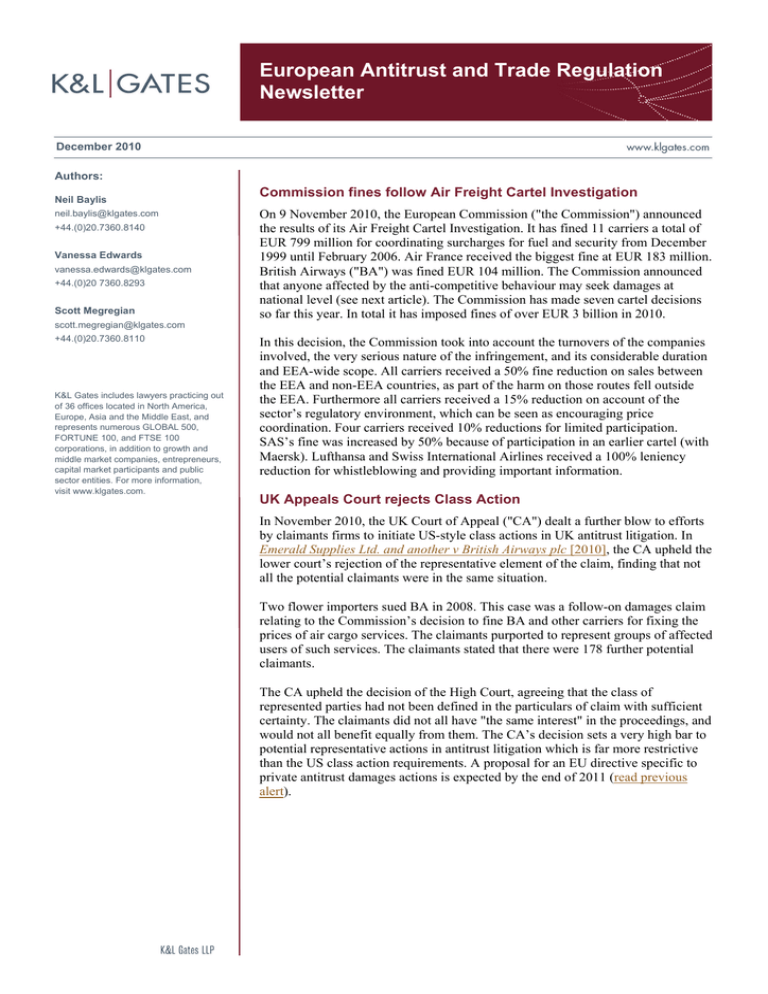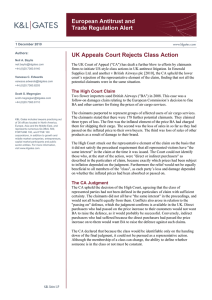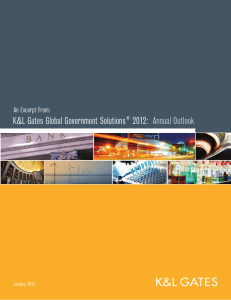
European Antitrust and Trade Regulation
Newsletter
December 2010
Authors:
Neil Baylis
neil.baylis@klgates.com
+44.(0)20.7360.8140
Vanessa Edwards
vanessa.edwards@klgates.com
+44.(0)20 7360.8293
Scott Megregian
scott.megregian@klgates.com
+44.(0)20.7360.8110
K&L Gates includes lawyers practicing out
of 36 offices located in North America,
Europe, Asia and the Middle East, and
represents numerous GLOBAL 500,
FORTUNE 100, and FTSE 100
corporations, in addition to growth and
middle market companies, entrepreneurs,
capital market participants and public
sector entities. For more information,
visit www.klgates.com.
Commission fines follow Air Freight Cartel Investigation
On 9 November 2010, the European Commission ("the Commission") announced
the results of its Air Freight Cartel Investigation. It has fined 11 carriers a total of
EUR 799 million for coordinating surcharges for fuel and security from December
1999 until February 2006. Air France received the biggest fine at EUR 183 million.
British Airways ("BA") was fined EUR 104 million. The Commission announced
that anyone affected by the anti-competitive behaviour may seek damages at
national level (see next article). The Commission has made seven cartel decisions
so far this year. In total it has imposed fines of over EUR 3 billion in 2010.
In this decision, the Commission took into account the turnovers of the companies
involved, the very serious nature of the infringement, and its considerable duration
and EEA-wide scope. All carriers received a 50% fine reduction on sales between
the EEA and non-EEA countries, as part of the harm on those routes fell outside
the EEA. Furthermore all carriers received a 15% reduction on account of the
sector’s regulatory environment, which can be seen as encouraging price
coordination. Four carriers received 10% reductions for limited participation.
SAS’s fine was increased by 50% because of participation in an earlier cartel (with
Maersk). Lufthansa and Swiss International Airlines received a 100% leniency
reduction for whistleblowing and providing important information.
UK Appeals Court rejects Class Action
In November 2010, the UK Court of Appeal ("CA") dealt a further blow to efforts
by claimants firms to initiate US-style class actions in UK antitrust litigation. In
Emerald Supplies Ltd. and another v British Airways plc [2010], the CA upheld the
lower court’s rejection of the representative element of the claim, finding that not
all the potential claimants were in the same situation.
Two flower importers sued BA in 2008. This case was a follow-on damages claim
relating to the Commission’s decision to fine BA and other carriers for fixing the
prices of air cargo services. The claimants purported to represent groups of affected
users of such services. The claimants stated that there were 178 further potential
claimants.
The CA upheld the decision of the High Court, agreeing that the class of
represented parties had not been defined in the particulars of claim with sufficient
certainty. The claimants did not all have "the same interest" in the proceedings, and
would not all benefit equally from them. The CA’s decision sets a very high bar to
potential representative actions in antitrust litigation which is far more restrictive
than the US class action requirements. A proposal for an EU directive specific to
private antitrust damages actions is expected by the end of 2011 (read previous
alert).
European Antitrust and Trade Regulation
EU’s highest court refuses to extend
privilege to communications with inhouse lawyers
In September 2010, the European Court of Justice
("ECJ") gave its judgment in Akzo Nobel
Chemicals Ltd. and Akcros Chemicals Ltd. v
European Commission (read previous alert). The
final decision confirms 30-year-old case law
which held that internal communications with inhouse lawyers do not attract legal professional
privilege in the context of EU competition law
investigations. The ECJ dismissed the appeal on
the basis that in-house lawyers are not
sufficiently independent from their employer to
justify the extension of the privilege, despite any
professional and ethical duties of independence
imposed upon them by their national Bar or Law
Society.
The decision is important for any company with
dealings in the EU. It is expected to apply to all
EU investigations in a regulatory context, and it
means that the Commission will continue to be
able to seize and use advice and other documents
transmitted between employer and in-house
lawyer. In-house counsel should consider seeking
external advice from EEA-qualified counsel on
all regulatory matters, ensuring that all
documents connected with such advice are
marked as "privileged", stored separately and not
summarised or amended internally. They should
also consider giving any internal advice on
regulatory matters orally.
OFT announces investigation into
Ryanair’s holding in Aer Lingus
The UK Office of Fair Trading ("OFT")
announced a merger investigation on 29 October
2010 into Ryanair Holdings plc’s minority
29.82% shareholding in Aer Lingus Group plc.
As reported in the K&L Gates July 2010
Antitrust Newsletter, the General Court in July
2010 dismissed appeals against two 2007
Commission decisions in relation to this
acquisition. The first was to block Ryanair’s
attempted acquisition of Aer Lingus. The second
was to refuse to order Ryanair to divest its
minority shareholding, on the grounds that this
did not give it effective control over Aer Lingus,
and therefore could not constitute a merger under
the EU merger regulation.
The OFT is now examining whether it has
jurisdiction to review this transaction. This will
involve two main considerations. First the OFT
must determine whether it is time barred from
investigating and referring the transaction, as the
four-month time limit since the acquisition is
well passed. It may be able to take advantage of
an exception which allows for situations where,
because of EU proceedings, OFT action could
not have been taken any earlier. The OFT has
never previously relied on this exception.
Secondly, it must consider whether Ryanair is
able to exercise "material influence" over Aer
Lingus’s business activities, as this comes under
the definition of control in the Enterprise Act
2002. Interestingly, "material influence" is more
easily satisfied than the "decisive influence"
standard in the EU merger regulation. The OFT
will mainly look at influence via shareholder
voting, influence over the board, and influence
by other commercial arrangements.
If the OFT does have jurisdiction, it will need to
assess whether the acquisition gave rise to a
substantial lessening of competition in the UK
market for budget air travel. The OFT has
written to Ryanair for further information, and
has also sought comments from third parties.
Ryanair has unsurprisingly strongly criticised the
opening of this investigation. A decision is
expected by 24 December 2010.
CA says CAT cannot extend follow-on
deadline
In BCL Old Co and others v BASF and others
[2010], the CA confirmed that the Competition
Appeal Tribunal ("CAT") does not have the
power to extend the deadline for bringing a
follow-on damages claim beyond the expiry of
the prescribed two-year period. This is bad news
for potential claimants in follow-on damages
actions. Where there is an appeal against the
competition authority’s decision, this time period
is in principle suspended, but only if the appeal
relates to the infringement decision itself, and
not just to the amount of the penalty imposed.
Furthermore, the time period to bring a claim
against any addressee of the decision does not
start until any appeals against the infringement
decision are completed and any time limits in
which to appeal have expired.
Background
Follow-on claims can be brought in the CAT
under s.47A Competition Act 1998. There is a
two-year deadline under the 2003 CAT Rules,
which starts with the later of the date on which
the cause of action accrued, the date on which a
December 2010
2
European Antitrust and Trade Regulation
right to bring an appeal expires, or the date of the
final judgment on appeal.
The Commission fined a number of companies
on 21 November 2001 for participating in a cartel
in the vitamin-sales market. Following an appeal
from BASF as to the penalty imposed, the fines
were reduced by the Court of First Instance
("CFI", now called the General Court) in a
judgment handed down on 15 March 2006. That
decision was not appealed to the ECJ within the
two-month time limit for bringing such an appeal.
The Initial CAT Claim
This claim ("the BCL Claim") was originally
brought on 12 March 2008, with another similar
claim being brought on 14 May 2008 by
Grampian Country Food Group and others ("the
Grampian Claim"). The CAT decided that the
BCL Claim was within time because the two-year
time period did not start until the expiry of the
deadline for appealing the CFI’s judgment. An
earlier CAT decision meant that this reasoning
could be applied to all claimants even if they
were going against different cartel participants,
and so the Grampian Claim was also allowed to
proceed.
The First CA Decision
BASF appealed against this decision, and the CA
in 2009 overturned the ruling, saying that the
deadline is not extended by a pending appeal
where that appeal relates only to the amount of
the penalty imposed. The correct deadline was
two years from the expiry of the period in which
the Commission infringement decision could
have been appealed to the CFI. This would have
been January 2004, and so both claims had been
brought well out of time.
The Latest CA Decision
Both parties applied to the CAT for a time
extension under Rule 19 of the CAT Rules,
which gives the CAT a discretion to give such
directions as it thinks fit, including extending
time limits, to secure the just, expeditious and
economical conduct of the proceedings. The CAT
refused, considering that the claimants did not
have a good reason to extend the time limit. They
had not demonstrated there had been a reasonable
misinterpretation of the law relating to the
relevant limitation period and they had delayed in
pursuing claims once they were aware the time
period had begun.
The CAT refused the claimants permission to
appeal this decision, but the CA subsequently
granted it directly. The issues on appeal were
whether the CAT had the power to extend time
for a follow-on claim, and if not, whether such a
power should be treated as existing by reason of
EU principles.
However on judgment the CA decided that the
CAT Rules did not grant a specific discretion to
extend the time limit in relation to follow-on
actions. Furthermore the EU principle of
effectiveness had not been offended and those of
legal certainty and legitimate expectation were
not relevant. The claimants’ claims had therefore
been correctly refused and the appeal was
dismissed.
EU broadens Iran sanctions with new
Regulation
On 25 October 2010, the EU Council adopted
Regulation 961/2010 ("the Regulation") which
considerably broadened the scope of the previous
EU economic sanctions against Iran. The
Regulation applies directly in all EU Member
States.
The Regulation, which came into force on 27
October 2010, imposes restrictions on a number
of sectors, including trade, investment, finance,
and transport of goods. It applies within the EU,
including its airspace, and on board any aircraft
or vessel under the jurisdiction of an EU
Member State. It applies to all EU nationals and
EU corporate entities and to all non-EU
corporate entities which do business in the EU
"in whole or in part". The Regulation will likely
create sanctions risks and compliance challenges
for many US and other non-EU businesses and
financial institutions.
Trade
The Regulation prohibits transactions (whether
into or out of Iran and including the provision of
technical or financial assistance or brokering
services) relating to "Prohibited Goods". These
are specified goods and technology which:
•
are dual-use;
•
might be used to further internal repression;
or
•
could contribute to the development of
weapons of mass destruction.
Authorisation is required for transactions
(whether into or out of Iran) in certain other
December 2010
3
European Antitrust and Trade Regulation
specified goods and technology which could
contribute to the development of nuclear
activities or weapons ("Goods Requiring
Authorisation"). The Regulation prohibits
Member States from granting authorisations if
they have reasonable grounds to determine that a
transaction would contribute to such
development. The UK government has stated that
it will no longer authorise the export of such
goods and technology (although existing licences
will not be revoked). The Regulation also
prohibits the knowing or intentional participation
in activities the object or effect of which is to
circumvent the prohibition of these transactions.
Importantly, the Regulation introduces a ban on
the sale, supply, transfer and export of key oil and
natural gas-related equipment and technology, as
well as related technical and financial assistance.
Obligations under contracts concluded before 26
July 2010 are exempt from the Regulation,
although an EU party must notify Member State
authorities at least 20 working days prior to the
transaction in question.
Investment
The Regulation prohibits the financing of,
participation in or joint venture involving any
Iranian parties which manufacture Prohibited
Goods or are engaged in the oil or gas sectors and
also involvement in any such dealings by Iranian
parties engaged in nuclear activities. Again,
authorisation is required for such dealings
involving Iranian parties which manufacture
Goods Requiring Authorisation. The Regulation
prohibits Member States from granting
authorisations if they have reasonable grounds to
determine that a transaction would contribute to
the development of nuclear activities or weapons.
Finance
The Regulation imposes new restrictions on
financial institutions and banks. All funds
belonging to or controlled by listed Iranian
persons and entities are to be frozen. All transfers
of funds to and from an Iran party (excluding
those relating to humanitarian purposes) which
exceed €40,000 are subject to prior authorisation
by Member State authorities. This is not to be
granted if there are reasonable grounds to
determine that the transfer would contribute to
the development of nuclear activities or weapons
or activities in the oil or gas sectors. All such
transfers above €10,000 require prior notification
to Member State authorities. EU branches and
subsidiaries of Iranian banks are required to
notify all transfers of funds. EU banks are
subject to higher record-keeping and reporting
standards for services rendered to such EU
branches and subsidiaries of Iranian banks as
well as to non-Iranian credit and financial
entities owned or controlled by Iranian parties.
Those subject to the Regulation may not provide
insurance to the Iranian government or Iranian
parties, or persons acting on their behalf.
Transport
All cargo entering or leaving the EU from or to
Iran must now include pre-arrival and predeparture information about such goods. The
provision of supplies or services to vessels or
cargo aircraft owned or controlled by an Iranian
person or entity is prohibited where the providers
of the service have reasonable grounds to believe
that the vessels carry Prohibited Goods. In
addition, an earlier EU Council decision requires
Member States to prevent their airports from
being accessed by Iranian cargo flights.
Finally, Member States are permitted to derogate
from the above prohibitions and requirements for
authorisation, essentially where they are satisfied
with the proposed use to which the goods,
investment or finance will be put.
Enforcement of the sanctions is a matter for
individual Member States.
For a commentary on the recent US sanctions on
Iran please see our alert.
London trainee James A. Boyd and London
assistant Hugh Carlson contributed to parts of this
Newsletter.
December 2010
4
European Antitrust and Trade Regulation
Anchorage Austin Beijing Berlin Boston Charlotte Chicago Dallas Dubai Fort Worth Frankfurt Harrisburg Hong Kong London
Los Angeles Miami Moscow Newark New York Orange County Palo Alto Paris Pittsburgh Portland Raleigh Research Triangle Park
San Diego San Francisco Seattle Shanghai Singapore Spokane/Coeur d’Alene Taipei Tokyo Warsaw Washington, D.C.
K&L Gates includes lawyers practicing out of 36 offices located in North America, Europe, Asia and the Middle East, and represents numerous
GLOBAL 500, FORTUNE 100, and FTSE 100 corporations, in addition to growth and middle market companies, entrepreneurs, capital market
participants and public sector entities. For more information, visit www.klgates.com.
K&L Gates is comprised of multiple affiliated entities: a limited liability partnership with the full name K&L Gates LLP qualified in Delaware and
maintaining offices throughout the United States, in Berlin and Frankfurt, Germany, in Beijing (K&L Gates LLP Beijing Representative Office),
in Dubai, U.A.E., in Shanghai (K&L Gates LLP Shanghai Representative Office), in Tokyo, and in Singapore; a limited liability partnership (also
named K&L Gates LLP) incorporated in England and maintaining offices in London and Paris; a Taiwan general partnership (K&L Gates)
maintaining an office in Taipei; a Hong Kong general partnership (K&L Gates, Solicitors) maintaining an office in Hong Kong; a Polish limited
partnership (K&L Gates Jamka sp. k.) maintaining an office in Warsaw; and a Delaware limited liability company (K&L Gates Holdings, LLC)
maintaining an office in Moscow. K&L Gates maintains appropriate registrations in the jurisdictions in which its offices are located. A list of the
partners or members in each entity is available for inspection at any K&L Gates office.
This publication is for informational purposes and does not contain or convey legal advice. The information herein should not be used or relied
upon in regard to any particular facts or circumstances without first consulting a lawyer.
©2010 K&L Gates LLP. All Rights Reserved.
December 2010
5




